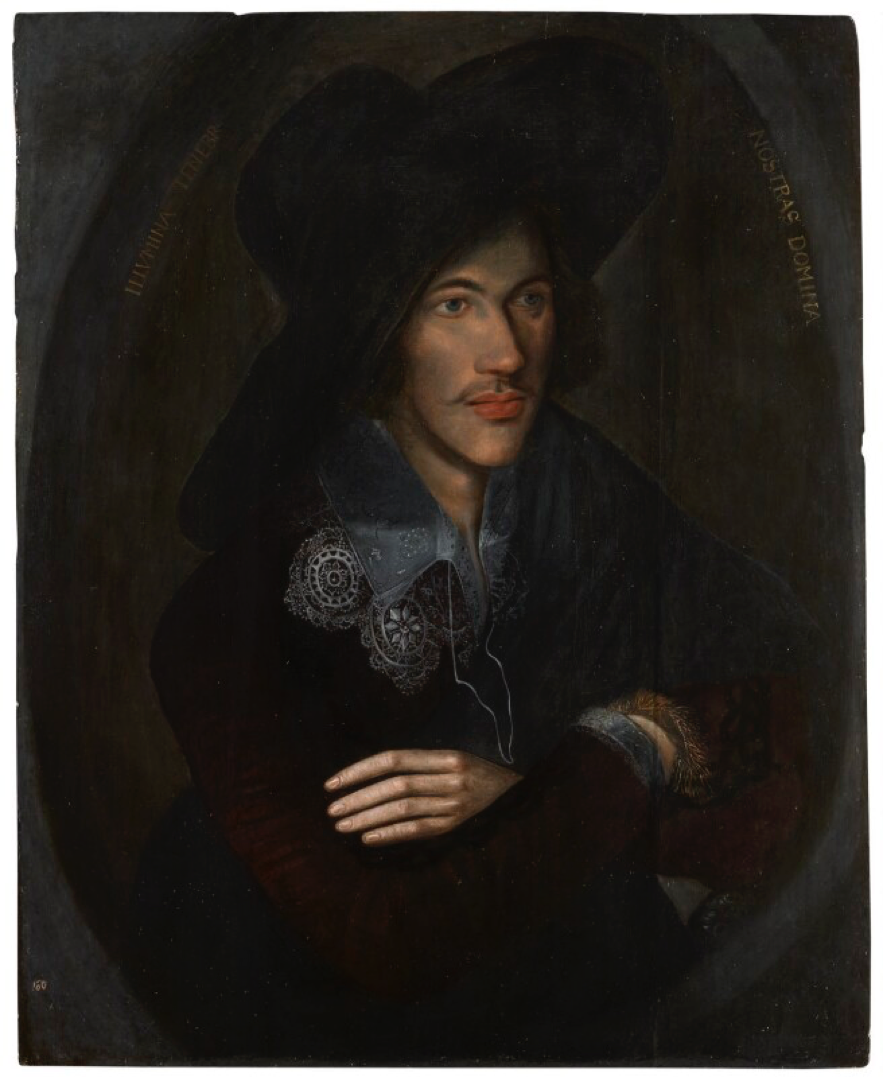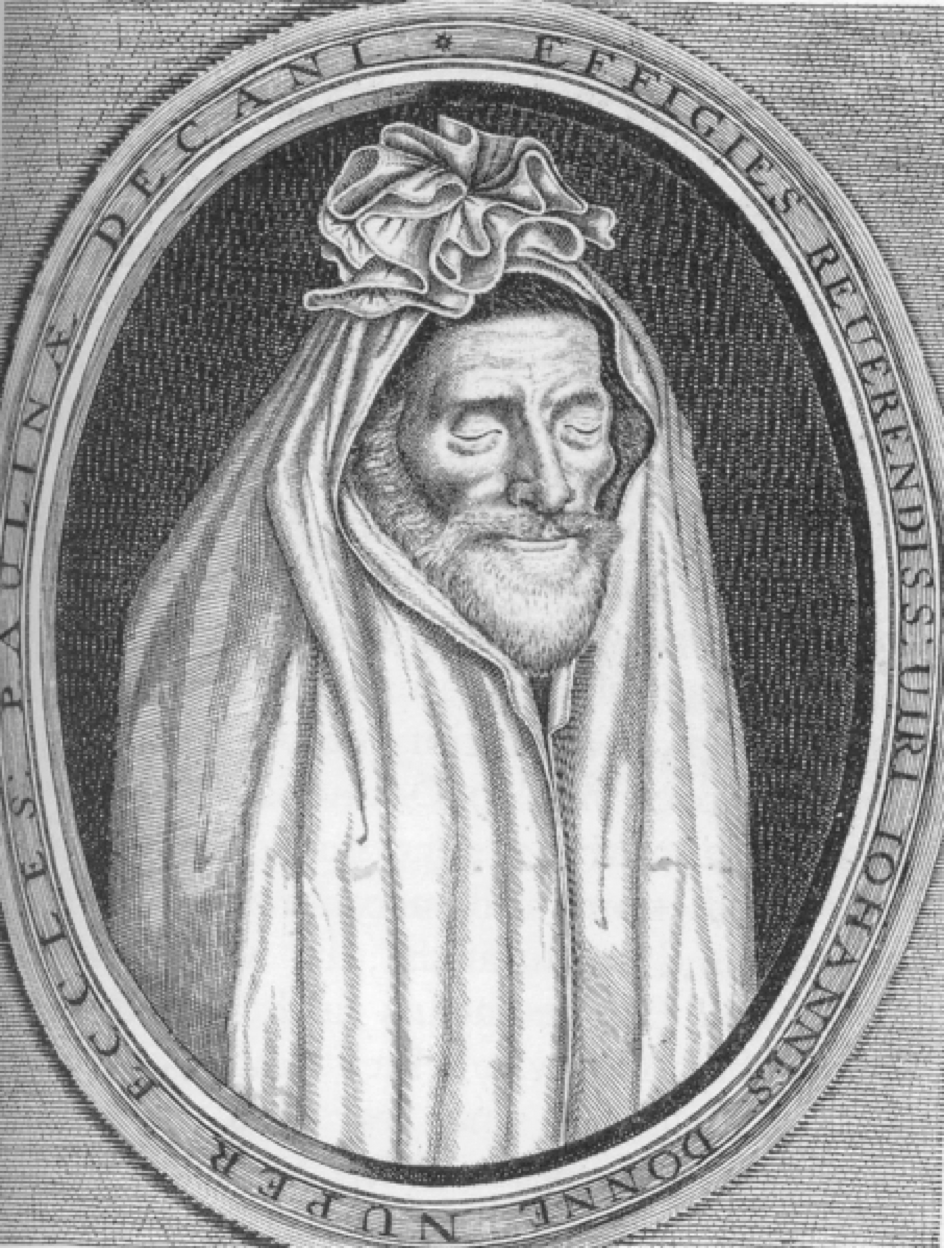John Donne (1572-1631)

John Donne (1572-31) is a poet of contradictions, the author of startlingly audacious seduction poems, such as “The Flea,” and equally audacious reflections on God and mortality.
As a young man, Donne pursued a career in government. His success seemed guaranteed when, at the age of twenty-five, he landed the position of chief secretary to Sir Thomas Egerton, Keeper of the Great Seal. Donne, however, fell in love with his employer’s niece, Anne More, and the couple married secretly in 1601. Anne’s family was outraged when they discovered the deceit. Donne and his accomplices in the wedding spent some time in prison, and Donne’s chances for advancement in government were dashed. The Donnes were indeed “un-done,” as John famously put it in a letter to his wife, which concluded, “John Donne, Anne Donne, Un-Done.” John and Anne lived in poverty for the sixteen years of their marriage. She bore twelve children (she died shortly after birthing the last, itself stillborn), whom Donne could scarcely afford to feed or bury. Encouraged by friends, he pursued a career in the Church of England. In 1615 he was ordained an Anglican priest. In 1621, he became Dean of St. Paul’s Cathedral, an office he held until his death in 1631.
Many of Donne’s poems were sonnets—fourteen-line poems whose formal features you will study in more depth later in this bundle. One of his innovations to the sonnet tradition was that he used that poetic form, which traditionally conveyed thoughts about love, art, and nature, to voice anguished reflections on God and salvation. In these sonnets, the speaker wishes the deity would take a more active role in his salvation—battering his heart, for example, or “ravishing” him. The deity is silent.
The anguish of Donne’s religious poetry can be illustrated by setting his famous sonnet “Batter my Heart” against the sonnet “Redemption” by his contemporary poet and fellow Anglican priest, George Herbert. In each of these poems, identify the metaphors the poets use to describe God. How do Donne’s metaphors differ from Herbert’s in nature and number? After you’ve looked at these poems, watch the accompanying video lecture.
Holy Sonnets, X
John Donne
Notes by Richard Dutton
Batter my heart, three-personed[1] God; for you
As yet but knock; breathe, shine, and seek to mend;
That I may rise, and stand, o’erthrow me, and bend
Your force, to break, blow, burn, and make me new.[2]
I, like an usurped town, to another due,[3]
Labour to admit you, but O, to no end.
Reason, your viceroy in me, me should defend,
But is captived, and proves weak or untrue.
Yet dearly I love you, and would be loved fain,
But am betrothed unto your enemy;
Divorce me, untie, or break that knot again,
Take me to you, imprison me, for I,
Except you enthrall me, never shall be free,
Nor ever chaste, except you ravish me.[4]
Mastery Check
- Which verbs does Donne use to describe what God should do to him?
- To what does Donne compare God–and to what does he compare himself (get all three comparisons!)
- What paradoxes can you find in “Batter my Heart”?
HAVING been tenant long to a rich lord,
Not thriving, I resolvèd to be bold,
And make a suit unto him, to afford
A new small-rented lease,[6] and cancel th’old.
In heaven at his manor I him sought:
They told me there, that he was lately gone
About some land which he had dearly bought
Long since on earth, to take possession.
I straight returned and, knowing his great birth,
Sought him accordingly in great resorts;
In cities, theaters, gardens, parks, and courts:
At length I heard a ragged noise and mirth
Of thieves and murderers;[7] there I him espied,
Who straight, Your suit is granted, said, and died.[8]
Mastery Check
- Find the paradox in Herbert’s “Redemption.”
- To what does Herbert compare God in “Redemption”?
- Does Herbert gain what he wants in “Redemption”–how?
Mastery Check
- In what ways does Donne’s conception of God differ from Herbert’s?
Donne and Death

National Portrait Gallery, London.
Another of Donne’s preoccupations in his later years is death. Indeed, in his 1640 biography of Donne, Izaak Walton relates that the poet, when persuaded by a friend to have a commemorative monument made, chose to be portrayed in his funeral garb, and even posed thus for the artist:
“Several charcoal fires being first made in his large study, he brought with him into that place his winding-sheet in his hand, and having put off all his clothes, had this sheet put on him, and so tied with knots at his head and feet, and his hands so placed as dead bodies are usually fitted, to be shrouded and put into their coffin or grave. Upon this Urn he thus stood, with his eyes shut, and with so much of the sheet turned aside as might show his lean, pale, and deathlike face, which was purposely turned towards the East, from whence he expected the second coming of his and our Saviour Jesus.” In this posture he was drawn at his just height; and when the picture was fully finished, he caused it to be set by his bed-side, where it continued and became his hourly object till his death, and was then given to his dearest friend and executor Dr. Henry King, then chief Residentiary of St. Paul’s, who caused him to be thus carved in one entire piece of white marble, as it now stands in that Church.”
The following are two of Donne’s most famous writings on death, the first a sonnet, the second a meditation composed during a serious illness in 1624. My lecture, recorded last year, reflects on Donne and death, and the circuitous path that took him from “The Flea” to the Church. I conclude by putting Donne’s “Meditation 17” into conversation with the New York Times Memorial Day Issue from 2020. I thought about redoing this lecture, removing its now so very tragically dated conclusion–but then I decided to keep it, at least for this year, thinking that you might appreciate the journey back through time…
Holy Sonnets, VI (“Death, be not proud”)
John Donne
Death, be not proud, though some have callèd thee
Mighty and dreadful, for thou art not so;
For those, whom thou think’st thou dost overthrow,
Die not, poor Death, nor yet canst thou kill me.
From rest and sleep, which but thy pictures be,
Much pleasure, then from thee much more must flow,[9]
And soonest our best men with thee do go,[10]
Rest of their bones, and soul’s delivery.
Thou’rt slave to fate, chance, kings, and desperate men,
And dost with poison, war, and sickness dwell;
And poppy, or charms can make us sleep as well, opiates
And better than thy stroke; why swell’st thou then? puff yourself up
One short sleep past, we wake eternally,
And Death shall be no more; Death, thou shalt die.
Mastery Check
- Why shouldn’t Death be proud? Name 3 reasons!
- Find a paradox in this sonnet.
- With whom does Death associate?
From Meditation 17
John Donne
“Nunc lento sonitu dicunt, Morieris”[11]
Now, this bell tolling softly for another, says to me, “Thou must die.”
Perchance he for whom this bell tolls may be so ill as that he knows not it tolls for him; and perchance I may think myself so much better than I am, as that they who are about me, and see my state, may have caused it to toll for me, and I know not that.
The Church is catholic, universal, so are all her actions; all that she does, belongs to all. When she baptizes a child, that action concerns me; for that child is thereby connected to that head which is my head too, and engraffed [grafted] into that body, whereof I am a member [the church]. And when she buries a man, that action concerns me: all mankind is of one author, and is one volume; when one man dies, one chapter is not torn out of the book, but translated into a better language; and every chapter must be so translated; God employs several translators; some pieces are translated by age, some by sickness, some by war, some by justice; but God’s hand is in every translation; and his hand shall bind up all our scattered leaves again, for that library where every book shall lie open to one another.
As, therefore, the bell that rings to a sermon calls not upon the preacher only, but upon the congregation to come; so this bell calls us all: but how much more me, who am brought so near the door by this sickness. …
The bell doth toll for him that thinks it doth; and though it intermit [pauses] again, yet from that minute, that that occasion wrought upon him, he is united to God. Who casts not up his eye to the sun when it rises? But who takes off his eye from a comet when that breaks out? Who bends not his ear to any bell, which upon any occasion rings? But who can remove it from that bell which is passing a piece of himself out of this world?
No man is an island, entire of itself; every man is a piece of the continent, a part of the main [mainland]; if a clod be washed away by the sea, Europe is the less, as well as if a promontory were, as well as if a manor [estate] of thy friend’s or of thine own were; any man’s death diminishes me, because I am involved in mankind. And therefore never send to know for whom the bell tolls; it tolls for thee….
Mastery Check
- For whom does the bell toll?
- No man is what, according to Meditation 17?
- Name four translators employed by God?
Reflecting on Donne, Today
If Donne were alive in the 1960s, I think he’d have been listening to Simon and Garfunkel. Paul Simon wrote meditations and set them to music. His songs meditate on some of the same themes that preoccupied Donne centuries earlier. “Sounds of Silence” (1964) is explicitly about loneliness and implicitly about connectedness. “I am a Rock” (1966) listens like a rejoinder to Donne’s “Meditation 18.” As the singer proclaims, “I am a rock, I am an island,” I can imagine Simon and Garfunkel whispering, “No man is an island.”
Donne’s influence was profound. Some of you may be familiar with Ernest Hemingway’s novel For Whom the Bell Tolls (1940).
That an author like Hemingway should be a reader of John Donne probably comes as no surprise. But what about theoretical physicist J. Robert Oppenheimer, who headed up the Los Alamos Laboratory during World War II, and produced the atomic bomb? Oppenheimer designated “Trinity” the code-name for the first detonation of a nuclear device, inspired, he said, by reading Donne’s poetry. What do you suppose Donne would have thought of Oppenheimer’s “Trinity”? Could—would—the God he imagines have visited such violence upon the earth?

Trinity was the code name given by Robert Oppenheimer to the first detonation of a nuclear device. The device, developed as part of the Manhattan Project, produced the atom bomb, which changed not only the course of the Second World War but humanity itself. The specter of nuclear annihilation continues to haunt the world we inhabit and always will. Oppenheimer said that the poetry of John Donne inspired him to call the device Trinity.
“Batter my heart, three-personed God.”
Mastery Check
- In what way was John Donne’s influence manifest in the Manhattan Project?
- How did John Donne choose to have himself represented for his commemorative monument?
- an allusion to the theology of the Trinity, which posits three distinct persons (Father, Son, and Holy Spirit making up one God. KW ↵
- The images here are all from metalworking: as yet Donne feels only that he is being “mended”, but he wants the intensity of effort to renew him completely. ↵
- Owing allegiance to someone other than the usurper (who is the devil). ↵
- In the sestet Donne moves from images of metalwork and warfare to love, marriage and ravishment (rape), all very physical situations to describe his spiritual desperation. The paradox of only becoming chaste by being raped is particularly acute. ↵
- Redemption: Literally, “buying back”, as Christ’s sacrifice redeemed humanity from its sin. Everything is comfortably couched in everyday terms of contract relations. ↵
- make …lease: ask him to grant a new lease, with a smaller rent. ↵
- thieves and murders: Three of the Gospels tell us that Christ was crucified with thieves on either side of him; Mark and Luke tell us that Barab'bas, who was freed in place of Christ, was a murderer. ↵
- Who … died: Note the marvelous economy of the sonnet form. It is as if the speaker makes his leisurely way through life and only appreciates the true import of Christ’s sacrifice at the very last minute. ↵
- We get pleasure from rest and sleep, which are only images of death, so how much more will we get from the real thing. ↵
- The good die with least qualm. ↵
- The Latin literally says: Now with their slow sounding they say, “You shall die.” ↵